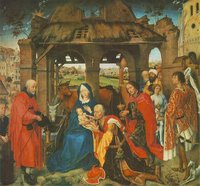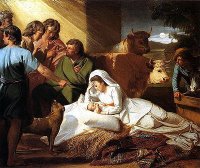Unbiblical Christmas Carols?
Q: During a recent discussion, one of our group stated that most of the Christmas Carols were not Biblical, particularly We Three Kings. What is the truth in this?
A: Although they may be meditative, devotional, celebratory, and containing some Scriptural truth, many carols depart from the Bible’s record. Does this mean we need to avoid them? Usually not. However, we shouldn’t base doctrine on them, use them to the exclusion of more Biblically accurate hymns, or forget to let Scripture inform us.
 Your example is a good start: Matthew speaks of wise men (magi), not kings, who came. Nowhere does the evangelist tell us that they appeared on or near the time of his birth — verse 11 says they saw the “child,” while Herod’s order to kill all of Bethlehem’s boys “two years old or under (v. 16)” shows that Jesus may not have been an infant anymore. Thus, the song is more an Epiphany than a Christmas carol.
Your example is a good start: Matthew speaks of wise men (magi), not kings, who came. Nowhere does the evangelist tell us that they appeared on or near the time of his birth — verse 11 says they saw the “child,” while Herod’s order to kill all of Bethlehem’s boys “two years old or under (v. 16)” shows that Jesus may not have been an infant anymore. Thus, the song is more an Epiphany than a Christmas carol.Also, while they gave three gifts (“gold and frankincense and myrrh”), the Bible doesn’t say there were three givers. At the same time, the verses of the carol dedicated to the individual gifts provide excellent theological illustrations about the meaning of each gift while the final stanza summarizes the completed work, the glorious resurrection, and the ascension of Jesus Christ:
Glorious now behold Him arise;
King and God and sacrifice;
Alleluia, Alleluia,
Sounds through the earth and skies.
 I’ll not attempt an exhaustive list, but here are a few more examples: Away in a Manger tells us that “the cattle are lowing” — this line assumes that Jesus was born in a cattle barn, while Scripture only tells us that Mary “laid him in a manger (Luke 2:7).”
I’ll not attempt an exhaustive list, but here are a few more examples: Away in a Manger tells us that “the cattle are lowing” — this line assumes that Jesus was born in a cattle barn, while Scripture only tells us that Mary “laid him in a manger (Luke 2:7).”Actually, the word usually translated as “inn” in this verse may also mean “guest room.” It could be that the manger was inside a home, a not uncommon practice in those days, when people and animals often shared accommodations.
This song also says of the Babe, “no crying He makes.” How else would a fully human newborn tell his parents that he needed food or a diaper change?
The First Noel talks of the shepherds following the star; the Bible plainly says that they followed the angel’s instructions (Luke 2:15-16). Scripture says that the Wise Men followed the star (Matthew 2:1-9).
So feel free to keep singing glorious praise to “the newborn King” who was born in the “little town of Bethlehem”; just remember to check the “facts” of these songs against the truth of His holy Word.
Scripture quoted from The Holy Bible, English Standard Version™, © 2001 by Crossway Bibles.
Send email to Ask the Pastor.
Walter Snyder is the pastor of Holy Cross Lutheran Church, Emma, Missouri and coauthor of the book What Do Lutherans Believe.

2 Comments:
I seem to vaguely recall that the earliest tradition was that there were twelve wise men (which, in view of Hebrew numerology, makes sense).
I definitely recall that congregations are apt to wax wroth when these things are pointed out to them!
Enjoyed your comments on the carols. Was interesting to see some of the assumptions made. Glad you pointed us to Scripture.
Post a Comment
<< Home